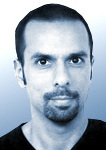Kundera's Friends Batallion
It is odd to me that so many publicists decided to defend Milan Kundera against the accusation that he went to the police to inform about someone having left a suspicious "kufr" at someone else's home. First of all, because none of the defenders have any proof that he did not, although they ask for a "better" proof than the one found by Respekt - which is the police "záznam" of Kundera's informing about the kufr. How can these people argue that, no, Kundera did not do that. Is that police record false? If it is, we still do not know, for no experts in falsifications touched the document yet. So, to that vehemently defend Kundera is foolish and "un-journalistic".
As a journalist who has to write about this to the Brazilian media (Kundera is as famous as Agatha Christie in Brazil), I can only take into account facts. Even if the reporter involved in the incriminating article has personal interest in the matter, for his relations with Iva Militká, that alone does not have to mean that someone falsified the documents to reach that objective. And if they did, that eventually will be revealed. But so far there is no indication that the police document is false. So, if Kundera did not stop by at the police station to alert them about the luggage in question, why would they have not only his name there, but also date of birth and address? ("Milan Kundera, nar. dne 1. 4. 1929 v Brně, bytem v Praze VII, studentská kolej, Tř. Krále Jiřího VI")
If it were an STb document, where some agent could have lied about, let's say, having gotten information from Jan Kavan, just to not disappoint a chief who expected that or to look like more successful than he actually was in squeezing dissidents, then I could take that into account. But for an unimportant police station to falsify that a student and still not important Kundera came over to tell them about the luggage is at least weird, even in the dark 1950s. Nevertheless, even if I speculate that the document pointing to Kundera is false, I cannot know yet and my job is to report it as real.
I understand that many people did not accept that Jaromir Nohavica could be an informer, because they look at him and at his songs and say, no, he is not that type. But it is more than evident that he was. The same about Jan Kanyza, at the time a not-so-talented actor looking for better roles. The truth is, though, that one's artistic talents do not have to reflect on their ethical and moral principles. Great people are often also capable of sordid acts. We are all human, after all.
Kundera was made of the same Czech fabric where patches of collaborationism and other cowardice are not that uncommon. The Czech culture does not award heroisms, rather the opposite.
It is not difficult to imagine that a young Kundera, under the atmosphere of fear from the 1950s, made such mistake. No matter what his reasons were, what we cannot is accept a simple denial from the interested part, the writer himself. Nor from his friends and admirers. If anyone wants to say that Kundera did not have anything to do with what the article accused him of, then they should come up with some sort of proof. The magazine did.
I had the opportunity to get insider's informations about former film director Antonin Kachlik, who has been ostracized after the November Revolution because of his ties with communism - he dated a close friend of mine until a couple of years ago. She told me a lot of details about him. What she loved the most was to overhear the telephone talks he had with Kundera. They are very good friends, having participated in sexual orgies together in the past, according to the director, who told me that personally in 2005, while he was, at the age of 77, still very active sexually (viz the relationship with my then 27 year old friend...) That kind of friendship with a director like Kachlik, whose past has been condemned by most of his colleagues, serve me as a hint over Kundera's view of the former regime here.
We cannot forget that Kundera was, like so many in the first years of communism, still under the spell of the Soviet Union. It is enough to read one of the writers first poems (for a song): “Our friendship arcs across the sky like a rainbow. The Soviet Union and our country will be together for ever and ever. Our friendship towers over us like a rocky peak above the waves. The warmongers will crack their skulls against that rock”.
So, until Kundera or anyone else offers some evidence that the long-time emigré did not denounce the suspicious kufr, I can only believe he did what the police document shows.

 Příliš drahá fotovoltaická chyba
Příliš drahá fotovoltaická chyba Anglický deník: Kdo je dneska vlastně kovaný Brit?
Anglický deník: Kdo je dneska vlastně kovaný Brit? Deník dobrovolníka: Jak jsem si připsal další bojové úlovky
Deník dobrovolníka: Jak jsem si připsal další bojové úlovky Invaze nanečisto aneb Velké dojmy z malé invaze přes tichý rybník
Invaze nanečisto aneb Velké dojmy z malé invaze přes tichý rybník Trump německému kancléři: Invaze v Normandii pro vás "nebyl příjemný den"
Trump německému kancléři: Invaze v Normandii pro vás "nebyl příjemný den"

